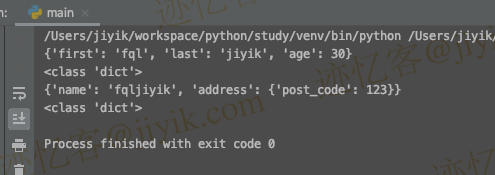在 Python 中将 OrderedDict 转换为常规 Dict
使用 dict() 函数将 OrderedDict 转换为常规字典,例如 dictionary = dict(ordered_dict) 。 dict() 函数可以传递一个可迭代的键值对并返回一个新字典。
from collections import OrderedDict
import json
# ✅ 将 OrderedDict 转换为常规 Dict
ordered_dict = OrderedDict(
[('first', 'fql'),
('last', 'jiyik'),
('age', 30)]
)
dictionary = dict(ordered_dict)
# 👇️ {'first': 'fql', 'last': 'jiyik', 'age': 30}
print(dictionary)
print(type(dictionary)) # 👉️ <class 'dict'>
# ---------------------------------------------------
# ✅ 将嵌套的 OrderedDict 转换为常规字典
ordered_dict = OrderedDict(
[('name', 'fqljiyik'),
('address', OrderedDict([('post_code', 123)])),
]
)
json_str = json.dumps(ordered_dict)
regular_dict = json.loads(json_str)
# 👇️ {'name': 'fqljiyik', 'address': {'post_code': 123}}
print(regular_dict)
print(type(regular_dict)) # 👉️ <class 'dict'>

第一个示例使用 dict() 函数将 OrderedDict 对象转换为字典。
如果它不是嵌套的 OrderedDict 对象,我们可以直接将 OrderedDict 传递给 dict() 函数。
from collections import OrderedDict
ordered_dict = OrderedDict(
[('first', 'fql'),
('last', 'jiyik'),
('age', 30)]
)
dictionary = dict(ordered_dict)
# 👇️ {'first': 'fql', 'last': 'jiyik', 'age': 30}
print(dictionary)
print(type(dictionary)) # 👉️ <class 'dict'>
print(dictionary['first']) # 👉️ fql
print(dictionary['last']) # 👉️ jiyik
可以向 dict() 类传递一个可迭代的关键字参数或可迭代的键值对,并返回一个新字典。
如果我们有嵌套的
OrderedDict对象,请改用 json 模块。
在 Python 中将嵌套的 OrderedDict 转换为常规的 Dict
要将嵌套的 OrderedDict 转换为常规字典:
-
使用
json.dumps()方法将嵌套的 OrderedDict 转换为 JSON 字符串。 -
使用
json.loads()方法将 JSON 字符串转换为本机 Python 字典。
from collections import OrderedDict
import json
ordered_dict = OrderedDict(
[('name', 'fqljiyik'),
('address', OrderedDict([('post_code', 123)])),
]
)
json_str = json.dumps(ordered_dict)
regular_dict = json.loads(json_str)
# 👇️ {'name': 'fqljiyik', 'address': {'post_code': 123}}
print(regular_dict)
print(type(regular_dict)) # 👉️ <class 'dict'>

第一步是使用 json.dumps() 方法将嵌套的 OrderedDict 对象转换为 JSON 字符串。
from collections import OrderedDict
import json
ordered_dict = OrderedDict(
[('name', 'fqljiyik'),
('address', OrderedDict([('post_code', 123)])),
]
)
json_str = json.dumps(ordered_dict)
print(json_str) # 👉️ {"name": "fqljiyik", "address": {"post_code": 123}}
print(type(json_str)) # 👉️ <class 'str'>
json.dumps 方法将 Python 对象转换为 JSON 格式的字符串。
最后一步是使用
json.loads()方法将 JSON 字符串解析为本机 Python 字典。
from collections import OrderedDict
import json
ordered_dict = OrderedDict(
[('name', 'fqljiyik'),
('address', OrderedDict([('post_code', 123)])),
]
)
json_str = json.dumps(ordered_dict)
regular_dict = json.loads(json_str)
# 👇️ {'name': 'fqljiyik', 'address': {'post_code': 123}}
print(regular_dict)
print(type(regular_dict)) # 👉️ <class 'dict'>
json.loads 方法将 JSON 字符串解析为本机 Python 对象。
我们不能直接将嵌套的
OrderedDict传递给dict()函数,因为dict()函数需要可迭代的关键字参数或可迭代的键值对。
my_dict = dict(
[('id', 1), ('first', 'fql'), ('last', 'jiyik')]
)
print(my_dict) # 👉️ {'id': 1, 'first': 'fql', 'last': 'jiyik'}
OrderedDict 类是 dict 的子类,它会记住其条目的添加顺序。
请注意,从 Python 3.7 开始,标准 dict 类也保证保留插入顺序。
相关文章
Python pandas.pivot_table() 函数
发布时间:2024/04/24 浏览次数:82 分类:Python
-
Python Pandas pivot_table()函数通过对数据进行汇总,避免了数据的重复。
在 Python 中将 Pandas 系列的日期时间转换为字符串
发布时间:2024/04/24 浏览次数:894 分类:Python
-
了解如何在 Python 中将 Pandas 系列日期时间转换为字符串
在 Python Pandas 中使用 str.split 将字符串拆分为两个列表列
发布时间:2024/04/24 浏览次数:1124 分类:Python
-
本教程介绍如何使用 pandas str.split() 函数将字符串拆分为两个列表列。
在 Pandas 中将 Timedelta 转换为 Int
发布时间:2024/04/23 浏览次数:231 分类:Python
-
可以使用 Pandas 中的 dt 属性将 timedelta 转换为整数。
Python 中的 Pandas 插入方法
发布时间:2024/04/23 浏览次数:112 分类:Python
-
本教程介绍了如何在 Pandas DataFrame 中使用 insert 方法在 DataFrame 中插入一列。
使用 Python 将 Pandas DataFrame 保存为 HTML
发布时间:2024/04/21 浏览次数:106 分类:Python
-
本教程演示如何将 Pandas DataFrame 转换为 Python 中的 HTML 表格。
如何将 Python 字典转换为 Pandas DataFrame
发布时间:2024/04/20 浏览次数:73 分类:Python
-
本教程演示如何将 python 字典转换为 Pandas DataFrame,例如使用 Pandas DataFrame 构造函数或 from_dict 方法。
如何在 Pandas 中将 DataFrame 列转换为日期时间
发布时间:2024/04/20 浏览次数:101 分类:Python
-
本文介绍如何将 Pandas DataFrame 列转换为 Python 日期时间。

